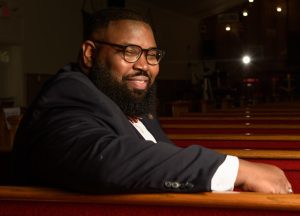As we close the book on the 2024 election cycle, we should look beyond the campaign promises and headlines to understand what truly fueled this election.
It wasn’t just about the economy, gas prices or immigration policies, although these were the talking points. At its core, this election was about preserving power and protecting the status quo of whiteness — a system that’s deeply rooted in America’s DNA.
For generations, whiteness has been protected by the structures of this country to keep those in power exactly where they are. And as the country faces demographic and cultural changes, this drive to keep whiteness at the center has only grown stronger.

Cassius L. Rudolph
When Vice President Kamala Harris entered the race after President Joe Biden’s unexpected withdrawal, she brought an impressive record of experience in law, governance and policy. Despite joining late, she quickly stood out as the most qualified candidate on the ballot. But, like many Black leaders before her, Harris’ path was far from smooth.
She faced not only the usual political challenges but also significant resistance from within her own party. Her candidacy underscored a hard truth in America: Black men and women often must work twice as hard to gain half the recognition. Despite her qualifications, Harris had to fight uphill, proving herself at every step in ways that many white candidates don’t have to.
For some, though, Harris’s qualifications were beside the point. This election became less about her readiness to lead and more about a deeper fear among many white voters — a fear of a changing power structure.
America is at a demographic crossroads, with projections showing white Americans soon will be a minority. This impending shift has sparked an urgency to keep whiteness in control, even if it means clinging to outdated policies or voting for leaders whose ideas may take us back decades. The message is clear: Many are willing to turn back the clock to preserve whiteness and its legacy, even if it stalls progress for everyone else.
“Black men and women often must work twice as hard to gain half the recognition.”
When we look at the exit polls, we see a stark divide: Black men and women came out in strong support of Harris, while many white voters either stayed home or supported her opponent. Even within the Latino demographic, there was a significant rise in Republican support.
This dynamic reflects a little-discussed but deeply ingrained reality in American society: For many, there’s a pressure to “audition” for acceptance into the structures of whiteness. My friend Jeremy McCool captured it well when he said, “You have to audition to become white.”
In other words, aligning oneself with whiteness often means distancing oneself from blackness and from candidates who represent racial equity. It’s as if supporting whiteness is a test some feel they must pass to be accepted.
But this election isn’t just about Kamala Harris or the next four years. It’s about preserving a system that has functioned for centuries to keep power in the hands of those who always have held it. America’s racial history reveals a pattern: Whiteness protects itself through policy, social dynamics and deliberate exclusion.
Whether it’s the Jim Crow laws of the past or more subtle forms of exclusion today, whiteness has been safeguarded to maintain control over resources, political power and social status. This election was yet another reminder that people often will choose to keep this system intact even if it means sacrificing progress or better policies for everyone.
This drive to protect whiteness isn’t just about individual identity. It’s about preserving the structures and advantages that whiteness provides, ensuring these benefits aren’t lost as the country grows more diverse. For many, this election was about keeping power centralized and defending a legacy of white dominance rather than truly considering what’s best for the future of the country.
In American history, we see this theme repeatedly: Policies and social norms evolve to defend whiteness whenever it’s threatened. From restrictive voting laws to biased economic policies, protecting whiteness often has taken precedence over fairness and equality.
“Today’s attempts to keep whiteness at the center of power may be less obvious, but they are still very real.”
Today’s attempts to keep whiteness at the center of power may be less obvious, but they are still very real. The policies and platforms of certain candidates reflect an effort to “make America great again” in a way that really means “keep whiteness secure.” This legacy of preserving power at all costs holds back the nation from achieving its full potential, especially as we become an increasingly diverse society.
But while this legacy continues to influence American politics, there also is a growing awareness and resilience among marginalized communities. Many Black and brown voters have shown up in historic numbers, supporting candidates who represent their values and interests. This election highlights that, while whiteness continues to protect itself, communities of color are more determined than ever to claim their rightful place and push for policies that reflect a just and inclusive future.
The truth is that achieving real freedom and equity in this country will require building our own power, focusing on our own communities and supporting leaders who reflect our goals. We can’t wait for a system built to protect whiteness to make room for everyone else. If this election tells us anything, it’s that we must look out for ourselves, create our own opportunities and ensure our voices are heard.
The fight for progress and inclusion doesn’t end with one election cycle. It’s an ongoing journey we must commit to.
So yes, the 2024 election was about much more than just policy debates or campaign promises. It was about protecting a legacy of power that whiteness has held onto tightly for generations. But there also is power in recognizing this reality and understanding that change is both necessary and inevitable.
As the country continues to diversify, we have the opportunity to build something new, something that truly represents all of us and that no legacy of whiteness can ultimately hold back. It’s up to us to keep showing up, to keep demanding progress and to keep pushing for a future where everyone has an equal shot at opportunity and leadership.
Cassius L. Rudolph, a native of Chicago, is a social justice leader, theologian and senior pastor of Saints’ Memorial Community Church in New Jersey. With a rich background in civil rights activism, he served as national field director of the Rainbow PUSH Coalition and led Alpha Phi Alpha’s “A Voteless People is a Hopeless People” program, driving efforts to register 1 million Black male voters in 2020. An esteemed lecturer on Black Liberation Theology and an ordained Baptist preacher, Rudolph is widely recognized in civic and academic circles, including an induction into Morehouse College’s Martin Luther King Jr. Board of Preachers.
Related articles:
Progressive white Christian men, it’s time to get some skin in the game | Opinion by Susan Shaw
How Trump and Harris fared with faith voters in 2024 | Analysis by Chris Hughes
Here’s the toxic racism and misogyny you let loose with a vote for Trump | Opinion by Rick Pidcock


